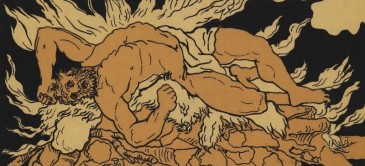More and more, the covert narcissist is being brought out into the mainstream light, along with their predatory nature, which lurks beneath their superficial helplessness and niceness. I’ve previously written that the covert narcissist is a seed which can exist in anyone with complex trauma, waiting to sprout at any moment. And yet, there is another type of covert narcissist who can be even more difficult to detect: The schizoid narcissist.
When someone is subjected to abuse in childhood, their natural responses range between fight, flight, fawn or freeze. ‘Fight’ is impossible due to their tiny size, and ‘flight’ is also not an option due to their utter helplessness in the outer world. That leaves them with ‘fawn’, which is to idolise the parent and try to win their heart through being submissive, or to ‘freeze’, which involves dissociating from reality and drifting off into the safety of their imagination.
A textbook narcissist is empowered by their narcissistic parent to achieve and pursue superiority, and so develops strong willpower and a sense of entitlement. Because covert narcissists are typically kneecapped and forced to toe the line, they choose fawn, becoming overly cooperative and desperate for the approval of their domineering parent.
The schizoid covert narcissist, on the other hand, was completely neglected. They received little attention or feedback. They were not told what good behaviour was, nor were they informed of their place in the dysfunctional family environment. They were given no responsibility, no say, and no value — they were merely told to keep quiet and not rock the boat.
Subliminally aware that they were unloved and unwanted, the schizoid internalised a burning feeling of unworthiness and inferiority rooted in toxic shame. This became the seed of their narcissistic pathology. Having had minimal feedback from outside, they also developed a sense of not being a part of the world, leaving them emotionally detached, as though staring at life through a psychological glass window.
Dissociating from reality and retreating into fantasy allowed the schizoid to numb the pain of abuse and worthlessness. By inhabiting only their mind, the schizoid could conjure an imaginary sense of connection and control. In their abusive family, the schizoid’s power to resist was forbidden. Anger was met with greater anger, frustration with greater frustration. The shame and terror became too much. The schizoid was forced to dissociate from their external experience and venture within to find reprieve.
The Life Of A Schizoid
The schizoid experiences the world in a detached, unreal state. They feel numb to their humanity, never able to absorb the entirety of their experience. They appear aloof or distracted, or ‘not entirely there’. They have one foot in reality, another in their imagination. They can spend vast periods fantasising and imagining great successes, escaping their life and going somewhere else, doing something better or being someone new.
Schizoids can be creative, since they have a unique ‘outsider’ perspective. They can think laterally, and their mind goes places the normal person’s rarely would. All narcissists draw on the schizoid state for their grandiosity and strange preferences, leaning heavily on it to defy reality and imagine themselves as superior and great. Some become artists, musicians or writers, or pursue something in the creative fields.
The schizoid has a flat emotional affect and an apparent indifference to people’s opinions. A low-level enthusiasm might come to them, but it quickly fades. They prefer solitude over the company of others. A schizoid reaction might take over a person after a relationship breakup. In such cases, the person might isolate themselves, become asexual, or avoid social engagements for an extended period. In the case of the schizoid covert narcissist, however, this state is permanent, having been there from an early age.
An Unattainable Love
The schizoid narcissist is generally self-contained within their dissociated state. What makes them unique to other narcissists is how they can feed themselves with narcissistic supply via their imagination when outer supply is low.
For this reason, the schizoid narcissist has less need to manipulate, control or shame people into submission. In this way, they are the lesser of the narcissistic evils. They tend to play fair and cooperate, appearing mildly content with your presence. You get a sense that they would be happy with or without you. While they are addicted to narcissistic supply, they feel no urgency to get it from you — they can supply it to themselves if need be. Yet if you offer supply of your own accord in the form of attention, sex, adulation or services, the schizoid narcissist will gladly accept it.
If the schizoid narcissist remains isolated for too long, however, the chronic loneliness gets too much, as dissociation, addictive substances, binge watching or pornography no longer provide the same dopamine hit yet they used to. So the schizoid narcissist re-enters the world, and socialises to obtain narcissistic supply, still certain that they could handle the leery emptiness if they failed to secure it.
The schizoid narcissist suffers from low self-esteem and repressed rage like any other covert narcissist. For this reason, they are wary of over-exposure, and often escape into solitude after being filled up with narcissistic supply. Limited in their capacity to tolerate intimacy, they flip-flop between wanting your presence and having no interest in you. In this way, the schizoid covert narcissist resembles someone with avoidant personality disorder. Their love bombing is half-hearted, and their gaslighting has no fangs. You write them off as eccentric, fascinating or merely unique.
Because of their covert repressed rage, the schizoid narcissist may grow sadistic or become dominant with subservient, codependent people, who offer themselves as human sacrifice on the schizoid narcissist’s altar in order to be loved by them. Such people were often raised by schizoid narcissistic parents. As a result, they seek to emulate their childhood with the schizoid covert narcissist, believing that this time, they will attain the love they never got.
Yet the limits of the schizoid’s ‘love’ can be immediately felt, as an avoidant/anxious, push-pull dynamic plays out. This leads to eventual disappointment, or an accepting of a rigid status quo where love is a scarce commodity controlled by the schizoid covert narcissist.
It is easy to fall for a schizoid narcissist, as their indifference to others gives them an air of superiority. Yet this is not fuelled by confidence, but rather by a sense of security derived from existing in a dissociated fantasy world without turbulence. When the pressure rises in the schizoid narcissist’s life, however, or you demand more of them, the cracks begin to appear.
For those who step onto the treadmill towards a schizoid narcissist’s love, an inevitable sense of despair will wash over you, as the more you sacrifice your self-worth, dignity and resources, the more the schizoid will gladly take, before retreating into their fortress of solitude. Meanwhile, the relationship never progresses, as your love is absorbed into a void, never to be seen again, not in the schizoid narcissist’s eyes, words or deeds. They remain utterly indifferent and unchanged by their time with you.









